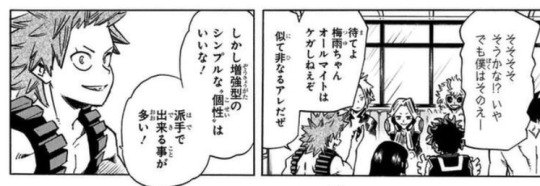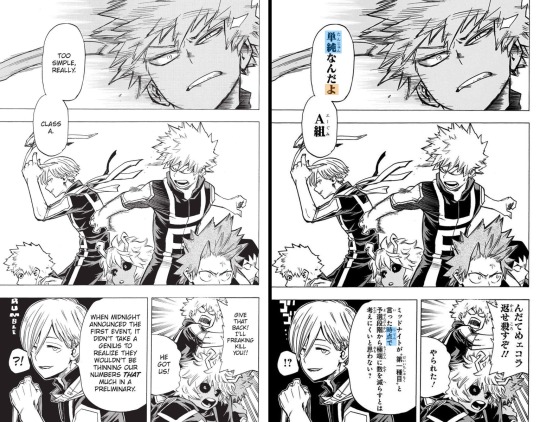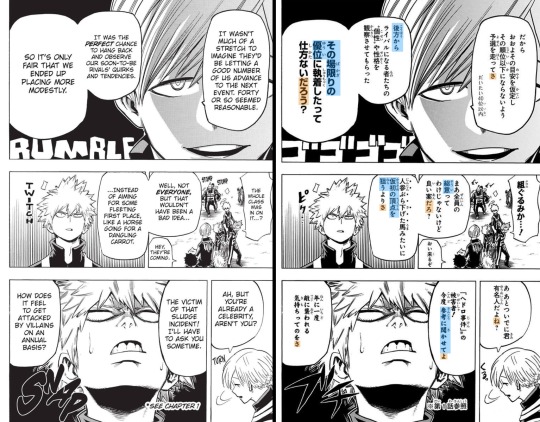#Monoma is such a smug little tryhard
Explore tagged Tumblr posts
Note
I've been wanting an excuse to talk about formality a little more in-depth, and Monoma is a delightful little maniac that I have written a little about before, so I'm tapping in.
First let me say that, in my opinion, Monoma speaking informally to Class 1-A is not rude on its own, it is rude because his intentions are clearly to be rude. Especially among male teenagers, casual language towards peers is not always rude in the “I am currently insulting you” sense, it can also reflect a “roughness” in their characterization, conveying a “regular dude” masculinity. I could be missing something here, but for example, I can’t think of a single time when Kaminari or Sero use formal speech with a peer.
Informality among peers is often a gesture of friendliness and reciprocation demonstrates group cohesion. Kirishima speaks casual macho man Japanese with all of his classmates from his earliest appearances, but he is accurately perceived as friendly and sincere.


Chapter 13
In fact, during the bus ride at the beginning of the USJ arc, Class 1-A have only known each other for a short while, yet everyone speaks casual Japanese, with one exception: Yaoyorozu. She is characterized as a very high class, dignified, intelligent girl, and she speaks formally all the time. You could argue that Yaoyorozu is, in a sense, rejecting the friendliness of her peers by responding formally. Perhaps not consciously; obviously she disapproves of the conversation, but we also know that she is often anxious and unsure how to make friends. That awkwardness and delicacy of speech are fundamentally part of her characterization.
Formality, or lack thereof, is not always just about the listener, often it is also about what kind of person the speaker wants to be seen as. I know some middle-aged women use formal language with their own family, because they want to maintain a sense of dignity and refinement even in front of their loved ones. It is important to their own self-image for them to conduct themselves with grace.
The other side of that spectrum is being unrefined, having swagger, acting rough and tumble, talking like you know what’s what. I haven’t brought up gender or social class in relation to formal/casual speech because it is complicated to say the least, but keep in mind that especially in media, the cultural images the character plays into are just as important to consider as their relationship to the person they are talking to.
Now then, let’s talk about Monoma Neito, Douchebag Extraordinaire.


Chapter 28
I’ve highlighted some things I think stick out in his way of speaking. There are two main things to note:
Word Choice: Monoma chooses more complex, specific, or erudite-sounding synonyms of common words and turns of phrase. Highlighted in blue.
“Friendly,” charismatic language: Monoma is speaking informal Japanese, and he uses a few specific particles to inflect his sentences: daro(u), yo, ne, and sa. These create a conversational, almost friendly tone. Highlighted in orange.
These choices serve two purposes: to talk down to 1-A, showing contempt especially in the condescending “Oh, can you keep up? Do you need a dictionary?” way. And, to make sure everyone still knows he has class.
Examples of word choices:
"Simple” - 単純 (tanjun) rather than 簡単 (kantan) The uses for tanjun and kantan overlap, but while kantan can be used to describe something that is easy to do, tanjun is used to describe people as simple-minded. This makes it clear that the subject of Monoma’s sentence is not the fact that he has gained the advantage over 1-A, it is 1-A themselves.
“When” - 時点で (jiten de) rather than 時に (toki ni) Jiten de seems more intense or dramatic compared to toki ni, a common phrase. This reads like “From the very moment Midnight announced the first event.” Using “when” softens the sentence and affords Monoma chill, and he makes it very clear that he has none.
“Behind” - 後方から (kouhou kara) rather than 後ろで (ushiro de) Kouhou kara reads as more conceptual, maybe even a little military-ish, like “the enemy approached from the rear.” Ushiro de is the every-day way to say "behind."
“Temporary advantage” - その場限りの優位 (sono bakagiri no yuui) rather than 仮の優位 (kari no yuui) or 一時的優位 (ichijiteki yuui) An uncommon phrase, which can be translated as “ad hoc advantage,” and he chooses it over the common word for temporary or even a simple phrase used to mean short-lived.
“Consensus” - 総意 (soui) rather than 同意する (doui suru) This is like the difference between someone saying, “We hardly came to what you could call a consensus” instead of “I mean, not everyone agreed.”
“Aiming for some fleeting first place” - 仮初の頂点を狙う (karisome no chouten wo nerau) Karisome means temporary just like sono bakagiri, but rather than repeat himself, Monoma chooses a new word to show off his vocabulary. Karisome carries the secondary meaning of trifling or trivial (hence the English translation’s use of “fleeting”), so this choice is even more insulting.
“Tell me for future reference” – 参考に聞かせてよ (sankou ni kikasete yo) This one just kills me. It's so annoyingly phrased. He could have said, さあ、興味があるけど (“You know, I’m curious/interested”) or even 聞かせてくれね (“Tell me about it,” in a do-me-a-favor way), but no, he issues a light, casual command for "reference."
As mentioned, casual speech from men can exude a “tough guy” vibe, and it often brings to mind working-class or delinquent social status with its unique flavor of masculinity. Katsuki intentionally plays into this image with his speech patterns.
Monoma explicitly avoids it.
He is meticulously crafting a social image here. He isn’t some empty-headed ruffian, as Katsuki is typically perceived. Monoma wants to be seen as brilliant, graceful, calculating, and charming.
It isn’t any one thing that does this, it is all of these little things together. The big thing is the actual content of his monologue at Katsuki, right? The way he is obviously taunting him. But all of these little details in his speech pattern intensify and add specificity to his characterization.
I glanced at a few of his other appearances, and I got the sense that this is one of the more extreme examples in the way that it is jam-packed with off-kilter word choices, because even 2-3 sophisticated synonyms wouldn't be that weird. Horikoshi has mentioned in interviews that he tries to make character entrances memorable, so Monoma’s behavior is turned up to eleven to give the reader an immediate sense of who he is and how he acts.
In short, Monoma talks like a teenager in debate club who studied a thesaurus to make himself look smarter than everyone else. Some of the fancy words he chooses actually use kanji that you learn in middle school, and this is their first term in high school, so he's just whipping them out right away.
Monoma is a raging edgelord just like Katsuki, but in the most opposite way possible, and it is so, so great.
i was wondering if you could go more in depth about monoma's way of taunting class 1a? i've seen the class 1b speech style but i was wondering if theres any cultural context that makes his manner especially strange, especially if he's using informal language with people he hasn't gotten close to. (i've seen some others mention that he talks in a very complex manner in japanese, as well as others saying that he speaks very intensity?) thank you!
I'm gonna be real, I don't know how to answer your question. To use informal speech with people you're not close to is pretty much definitionally disrespectful in Japanese, so it makes sense Monoma would do that. It's something I would also expect from another anime character like him. Perhaps this "complex manner/intensity" you're hearing about is a reference to how...dramatic and megalomaniacal he sounds? The dub isn't terrible at capture that vibe lol. In any case, there isn't anything that immediately sticks out about his manner of speech to me, but I haven't particularly paid close attention beyond what I've vaguely heard at times.
#meta#translations#mha 28#Monoma is such a smug little tryhard#it's hilarious#I commandeered pika's ask out of passion#can't fight my love of the game ya know#the game being linguistics meta#anyway hope this helps anon!#bakuhatsu asks
174 notes
·
View notes